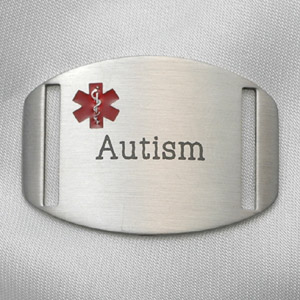Today is Day 2 of the National Health Blog Posting Month challenge, and one of the suggested prompts invites writers to address the weirdest aspect of their health. As a health advocate for my son George, who has autism, I am often struck by how odd this condition is compared with many other developmental disabilities.
One of the things that makes it different is the reluctance of many people, both within and outside of the autism community, to use the word “disabled”. Parents of children with Down Syndrome or cerebral palsy are allowed to refer to their kids as “disabled”, but I always have people trying to force me to use the term “differently abled”.
Yes, there are many things that George can do. He can read fluently, he was doing multiplication in his head long before anyone formally taught it to him, he has superb problem solving skills, and he knows his way around a computer better than I do. But when he comes home from school, he cannot tell me what his day was like. I have to keep a firm hold of him when we are out on family walks because he does not understand the danger of running out into the traffic. He does not know how to play with other kids. He will only take a shower if someone is in the shower with him, and at nine, he still needs hand-on-hand assistance and extensive prompting to accomplish the task of brushing his teeth.
To me, the term “differently abled” implies that George can do anything other kids his age can do, but in different ways. But that is not the case. There are things that George simply cannot do for himself – basic daily living skills that other kids master by the time they’re six. In my book, George is developmentally disabled.
And so what if he is? I am immensely proud of George. I adore his sweet, loving nature and I admire his absolute determination to accomplish his goals. Even though he is still so young, he shows a steel core of tenacity. This is not a kid who gives up. I feel absolutely no shame or embarrassment about the fact that he has a disability.
So why not tell it like it is? Why should there be a need to couch it in pretty language? Are these well-meaning attempts to avoid use of the word “disabled” not undermining our attempts to ensure acceptance and inclusion for people with all kinds of disabilities?
What are your thoughts? Are we heading into territory where the word “disability” cannot be used? Would you or do you use that word with reference to your own special needs child?











Thank you for this post, Kirsten. As a parent who has “normal” children, trying to be sensitive and “pc” when referring to the “differently abled / disabled” not to mention people from different ethnic groups and people who are blind, or deaf etc. is a HUGE struggle! 🙁
My personal belief (and what I have taught my children) is that we are ALL “powerful Spirits who have taken on the physical experience for the purpose of learning” (thank you Gary Zukav). Since I believe that, whatever shape, size, colour, ability etc that a “body” possesses, we’re all the same where it counts most, I want to be respectful of everyone’s uniqueness.
Unfortunately some people wear their “disability” as a badge of honour and expect us to treat them with a special deference to their feelings. You can’t have it both ways! If you want to be treated like everyone else, you need to TRY to fit in as much as we need to learn how to include you. For example, some deaf people refuse to learn how to speak and expect all of us to learn how to sign. To me, sign language is just like any other language. When I came to South Africa and could not speak English did anyone even suggest that all my friends should learn Italian in order to communicate with me? Of course not, I had to learn how to communicate in the way that the majority did. Do I TRY to use sign language if I know someone is deaf, of course I do … in the same way as I try to dredge up the little knowledge I have retained of High School French lessons to communicate with a French person!!
I have three adhd/atopic kids who are able in many ways and unable in others I have worked hard to give them opportunities to learn ‘normal’ behaviours and fit in but the tolerance of others is difficult as the sometime invisible nature of the conditions means people don’t realise the work needed so don’t listen to the parent so I am torn yes my children are able and different and disabled but to call them that means I as a parent have to suffer the disapproval of ppl because they don’t walk in our shoes ! So I dislike all terms as they all have up and down sides !
Marc and I heartily agree with you.